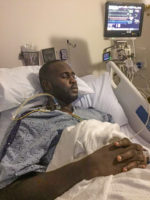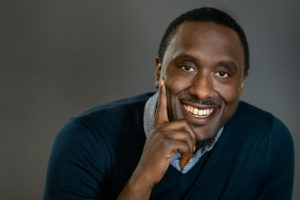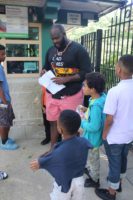On the basketball court George Boakye-Yiadom was a force.
Standing 6 feet, 7 inches and weighing 250 pounds, he was an imposing presence to the teams he faced on a nightly basis. He was big, yet quick; strong, yet agile.
The quintessential power forward.
Then, in 2015, Boakye-Yiadom met an opponent that was too much – even for him.
It started as a pain in his chest that spread to his back. What followed feels like a blur. A 911 call. A trip to the emergency room. A stroke two months later. And finally, a diagnosis of heart failure.

He was 25 and had just wrapped up his second year playing professional basketball in Europe.
“It all happened very fast,” said Boakye-Yiadom, now 30. “The doctor said that maybe the reason for that was because I worked out so much. My body was able to sustain itself until it couldn’t take it anymore.”
Boakye-Yiadom, who lives in Boston with his wife, Ivy, and his 10-year-old daughter, Aniyah, is now waiting for a heart transplant. While he waits, he is kept alive by an LVAD, a device doctors surgically implanted in his body to keep his blood flowing.
The wait for a heart transplant varies widely based on factors such as availability of donor hearts and blood type. Boakye-Yiadom may have to be more patient than most due to another factor – his size. He needs a heart large enough to support his frame.
“I’m not an average-sized person,” he said. “Me waiting on a heart is longer than a normal person.”
While he waits, Boakye-Yiadom said he is speaking out to raise awareness that even if you’re a professional athlete, your risk for heart disease isn’t eliminated. He also wants to encourage people to support scientific research in the fight against heart disease and stroke.
“We need to learn more about why this happens and stop it before it does,” he said.
Boakye-Yiadom is also talking about the impact heart disease can have on mental health. After his diagnosis, he fell into a deep depression.
At first, he was reluctant to seek help. As a native of Ghana who moved to the United States at age 12, it wasn’t in his culture to talk to a therapist.
“We were just taught to just get through it by praying,” he said.
At the insistence of his then-girlfriend, now-wife Ivy, Boakye-Yiadom was introduced to Charles Daniels, a Boston-based counselor. It was a decision that would change his life.

“We had a sit down and he really took to me like a mentor, not even as a therapist,” he said. “He was like, ‘You know what? I feel like you have a lot that you could do for yourself and the community.’”
Boakye-Yiadom soon learned that Daniels was not only a counselor, but also the founder of Fathers’ Uplift, a Boston-based nonprofit organization that helps dads overcome obstacles like jail sentences, addiction issues and financial strains that may prevent them from being part of their kids’ lives.

Daniels ultimately entrusted Boakye-Yiadom to help Fathers’ Uplift launch a youth enrichment program. The program provides mentorship to young men who do not have regular contact with their fathers.
“Without him, honestly, I don’t even know where I would be,” said Boakye-Yiadom. “I’d probably just give up. He really helped show me the person I could become.”
Last year, Fathers’ Uplift received $150,000 from the American Heart Association’s Social Impact Fund. This fund enables the Association to invest in local entrepreneurs, small businesses and organizations that are breaking down the social and economic barriers to healthy lives.
Investment like this are crucial to improving the health of Boston, said Boakye-Yiadom.
“Heart disease is the No. 1 cause of death in America, but it doesn’t have to be that way,” he said. “If we raise awareness and give people the opportunity to be healthier, we can decrease their chances of getting this disease.”
